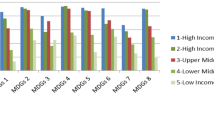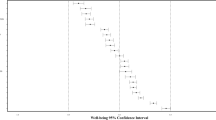Abstract
The purpose of this paper is to investigate the relationship between corruption and population health. Our cross-sectional sample covers 185 countries (54 high-income and 131 low-income countries) and the period of the analysis is 2005–2017. This research provides clear evidence that the level of corruption significantly affects physical health (expressed as life expectancy and Mortality rate) and mental health (expressed by happiness), under the moderating role of economic development and cultural framework. Moreover, we validate a powerful and positive correlation between the income level and both physical and mental health. Culture also has an important role in the corruption–health nexus, because we find evidence supporting four out of the six dimensions of culture (individualism versus collectivism, indulgence versus restraint, uncertainty avoidance and masculinity vs femininity) as having influence upon the physical and mental health of individuals. When we estimate the results on subsamples of countries (high-income and low-income countries), we validate a crisscross effect of corruption. Thus, a high level of corruption more deeply affects the physical health of population in low-income countries than in high-income countries. On the other hand, mental health is more pronouncedly affected by corruption in high-income countries than in low-income countries. This study may have important implications for national or international policy makers who need to acknowledge that anti-corruption policies play an important role in increasing population health, but they also need to adopt them according to the economic and cultural context of each nation.

Similar content being viewed by others
Availability of data and materials
All the data provided from public database.
References
Aaron, C.A.: Individualism/collectivism and cultures of happiness: a theoretical conjecture on the relationship between consumption, culture and subjective well-being at the national level. J. Happiness Stud. 3(1), 23–36 (2002)
Albert, I., Trommsdorff, G.: The role of culture in social development over the life span: an interpersonal relations approach. Online Read. Psychol. Culture (2014). https://doi.org/10.9707/2307-0919.1057
Ambraseys, N., Bilham, R.: Corruption kills. Nature 469(7329), 153–155 (2011)
Arvin, M., Lew, B.: Does income matter in the happiness–corruption relationship? J. Econ. Stud. 41(3), 469–490 (2014)
Arvin, B.M., Lew, B.: Development aid, corruption and the happiness of nations: analysis of 118 countries over the years 1996–2009. Appl. Econ. Int. Dev. 12(2), 69–78 (2012)
Atanasova, E., Pavlova, M., Groot, W.: Out-of-pocket patient payments for public health care services in Bulgaria. Front. Public Health 3(175), 175 (2015)
Azfar, O., Gurgur, T.: Does corruption affect health outcomes in the Philippines? Econ. Gov. 9(3), 197–244 (2008)
Bathaee, A.: Culture affects consumer behavior: theoretical reflections and an illustrative example with Germany and Iran, WirtschaftswissenschaftlicheDiskussionspapiere, No. 02/2011, Universität Greifswald, Rechts- und StaatswissenschaftlicheFakultät, Greifswald (2011). Available at https://www.econstor.eu/bitstream/10419/48881/1/658141252.pdf
Beugelsdijk, S., Maseland, R., Hoorn, A.: Are Hofstede’s culture scores stable over time? Glob. Strategy J. 5, 223–240 (2015)
Biggs, B., King, L., Basu, S., Stuckler, D.: Is wealthier always healthier? The impact of national income level, inequality, and poverty on public health in Latin America. Soc. Sci. Med. 71(2), 266–273 (2010)
Bjørnskov, C., Dreher, A., Fischer, J.A.V.: Cross-country determinants of life satisfaction: exploring different determinants across groups in society. Soc. Choice Welf. 30, 119 (2008)
Bulmahn, T.: Modernity and happiness—the case of Germany. J. Happiness Stud. 1, 375–399 (2000)
Centre for Community Child Health: the first thousand days—our greatest opportunity, policy brief number 28. Murdoch Children’s Research Institute/The Royal Children’s Hospital, Parkville, Victoria; Edition 28, March 2018 (2018). Available at https://www.rch.org.au/uploadedFiles/Main/Content/ccchdev/1803-CCCH-Policy-Brief-28.pdf. Accesed 7 Feb 2019
van Deurzen, I.: And justice for all: examining corruption as a contextual source of mental illness. Soc. Sci. Med. 173, 26–34 (2017)
Easterlin, R.: Explaining happiness. Proc. Natl. Acad. Sci. 100(19), 11176–11183 (2003)
Fielding, D.: Health and governance in developing countries. Health Econ. 20, 57–769 (2011)
Freedom House Romania: Fighting for rule of law- Corruption kills # Colectiv. http://www.freedomhouse.ro/component/k2/item/449-fighting-for-rule-of-law-%E2%80%93-corruption-kills (2015). Accessed Feb 2017
Gaitonde, R., Oxman, A.D., Okebukola, P.O., Rada, G.: Interventions to reduce corruption in the health sector. Cochrane Database Syst. Rev. 2016(8), CD08856 (2016)
Gordon, L., Biciunainte, A.: Economic growth and life expectancy—do wealthier countries live longer?, Euromonitor International. https://blog.euromonitor.com/economic-growth-and-life-expectancy-do-wealthier-countries-live-longer/ (2014). Accessed Feb 2017
Graham, C.: Adaptation amidst prosperity and adversity: insights from happiness studies from around the world. World Bank Res Obs. 25(1), 105–137 (2011)
Habibov, N.: Effect of corruption on healthcare satisfaction in post-soviet nations: a cross-country instrumental variable analysis of twelve countries. Soc. Sci. Med. 152, 119–124 (2016)
Joseph Jr, F.H., William, C.B., Barry, J.B., Rolph, E.A.: Multivariate data analysis, 7th edn. Pearson Prentice Hall, New Jersey (2010)
Hanf, M., Van-Melle, A., Fraisse, F., Roger, A., Carme, B., Nacher, M.: Corruption kills: estimating the global impact of corruption on children deaths. PLoS One 6(11), e26990 (2011)
Helliwell, J.F., Huang, H.: How’s your government? International evidence linking good government and well-being. Br. J. Polit. Sci. 38, 595–619 (2008)
Hofstede, G.: Dimensionalizing cultures: the Hofstede model in context. Online Read. Psychol. Culture (2011). https://doi.org/10.9707/2307-0919.1014
Hofstede, G., Minkov, M.: Cultures and organizations: software of the mind. McGraw-Hill, London (2010)
Holmberg, S., Rothstein, B.: Dying of corruption. Health Econ. Policy Law 6(4), 529–547 (2011)
Javidan, M., House, R.J., Dorfman, P.W., Hanges, P.J., De Luque, M.S.: Conceptualizing and measuring cultures and their consequences: a comparative review of globe’s and Hofstede’s approaches. J. Int. Bus. Stud. 37(6), 897–914 (2006)
Kahneman, D., Diener, E., Schwarz, N.: Well-being: the foundations of hedonic psychology. Russell Sage, New York (1999)
Li, Q., An, L., Xu, J., Baliamoune-Lutz, M.: Corruption costs lives: evidence from a cross-country study. Eur. J. Health Econ. 19, 153–165 (2018). https://doi.org/10.1007/s10198-017-0872-z
Minkov, M.: Predictors of differences in subjective well-being across 97 nations. Cross Cult. Res. 43, 152–179 (2009)
Mureșan, G.M., Ciumaș, C., Achim, M.V.: Can money buy happiness? Evidence for European Countries. Appl. Res. Qual. Life (2019). https://doi.org/10.1007/s11482-019-09714-3
Nadpara, N., Samanta, S.: An empirical examination of the effect of corruption on health outcomes. https://business.tcnj.edu/wp-content/uploads/sites/219/2015/07/Nadpara-Thesis-2015-revised.pdf (2015). New Jersey: The College of New Jersey, Accessed 20 Apr 2019
Napier, A.D., Ancarno, C., Butler, B., et al.: Lancet commission: culture and health. Lancet 384, 1607–1639 (2014)
Odobescu, V. When Corruption Kills: A Romanian Tragedy. Institute for Human Social Science. http://www.iwm.at/transit/transit-online/when-corruption-kills-a-romanian-tragedy/ (2015). Accessed Oct 14 2016
Wikipedia. List of nightclub fires (2019). Available at https://en.wikipedia.org/wiki/List_of_nightclub_fires. Accessed 4 Oct 2019
Petkov, M., Cohen, D.: Diagnosing corruption in healthcare, Transparency International UK. ISBN: 978-1-910778-60-9 (2016)
Preston, S.H.: The changing relation between mortality and level of economic development. Popul. Stud. 29(2), 231–248 (1975)
Samanni, M., Holmberg, S.: Quality of government makes people happy. In Quality of Government working paper series 2010:1. GO¨ TEBORG: The Quality of Government Institute Department of Political Science, University of Gothenburg (2010)
Schultz, P.T.: Handbook of development economics, 4th edn, p. 3406. Elsevier, New York (2008). (ISBN 978-0-444-53100-1)
Sommersguter-Reichmann, M., Stepan, A.: Hospital physician mechanisms in Austria: do they provide gateways to institutional corruption? Health Econ. Rev. 7, 11 (2017)
Souliotis, K., Golna, C., Tountas, Y., Siskou, O., Kaitelidou, D., Liaropoulos, L.: Informal payments in the Greek health sector amid the financial crisis: old habits die last. Eur. J. Health Econ. 17, 159–170 (2016)
Suh, E. M., Oishi, S. Subjective well-being across cultures. Online Read. Psychol. Cult. (2002). https://doi.org/10.9707/2307-0919.1076
The Hofstede Centre. http://geert-hofstede.com/ (2019). Accessed 15 Feb 2019
Transparency International: corruption perception index report (2015). Available at https://www.transparency.org/cpi2015
Institute, Urban: How are income and wealth linked to health and longevity? Center on Society and Health, Washington (2015)
Veenhoven, R.: World database of happiness, catalogue of happiness in nations (1999). Available at https://worlddatabaseofhappiness.eur.nl/. Accessed 3 Feb 2019
World Bank: World development indicators. World Bank, Washington (2019)
World Bank: Country and lending groups. World Bank, Washington (2015)
World Health Organization: Preamble to the Constitution of the World Health Organization as adopted by the International Health Conference, New York, 19–22 June, 1946; signed on 22 July 1946 by the representatives of 61 States (Official Records of the World Health Organization, no. 2, p. 100) and entered into force on 7 April 1948 (1948)
Wu, Y., Zhu, J.: When are people unhappy? Corruption experience, environment, and life satisfaction in Mainland China. J. Happiness Stud. 17(3), 1125–1147 (2016)
Acknowledgements
The corresponding author would like to thank the potential reviewers for the insightful comments.
Funding
No funding was used for supporting this work.
Author information
Authors and Affiliations
Contributions
The authors contributed equally to the development of the study. All the three authors have read and approved the final manuscript.
Corresponding author
Ethics declarations
Conflict of interests
The authors declare that they have no competing interests.
Additional information
Publisher's Note
Springer Nature remains neutral with regard to jurisdictional claims in published maps and institutional affiliations.
Electronic supplementary material
Below is the link to the electronic supplementary material.
Rights and permissions
About this article
Cite this article
Achim, M.V., Văidean, V.L. & Borlea, S.N. Corruption and health outcomes within an economic and cultural framework. Eur J Health Econ 21, 195–207 (2020). https://doi.org/10.1007/s10198-019-01120-8
Received:
Accepted:
Published:
Issue Date:
DOI: https://doi.org/10.1007/s10198-019-01120-8




